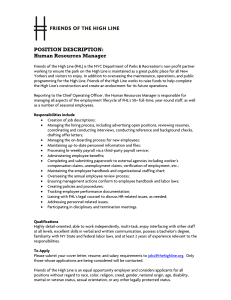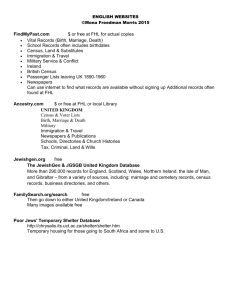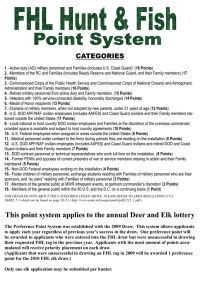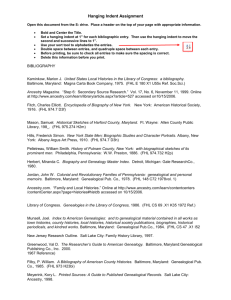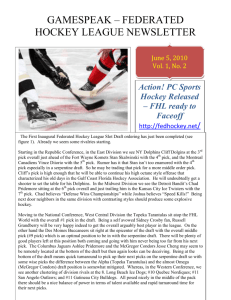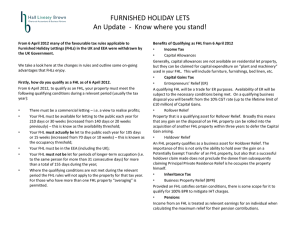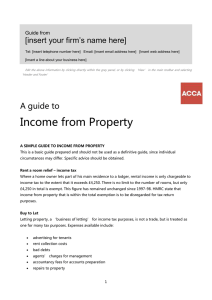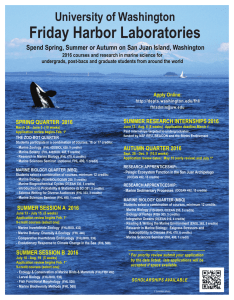Furnished Holiday Lettings - advice to owners
advertisement
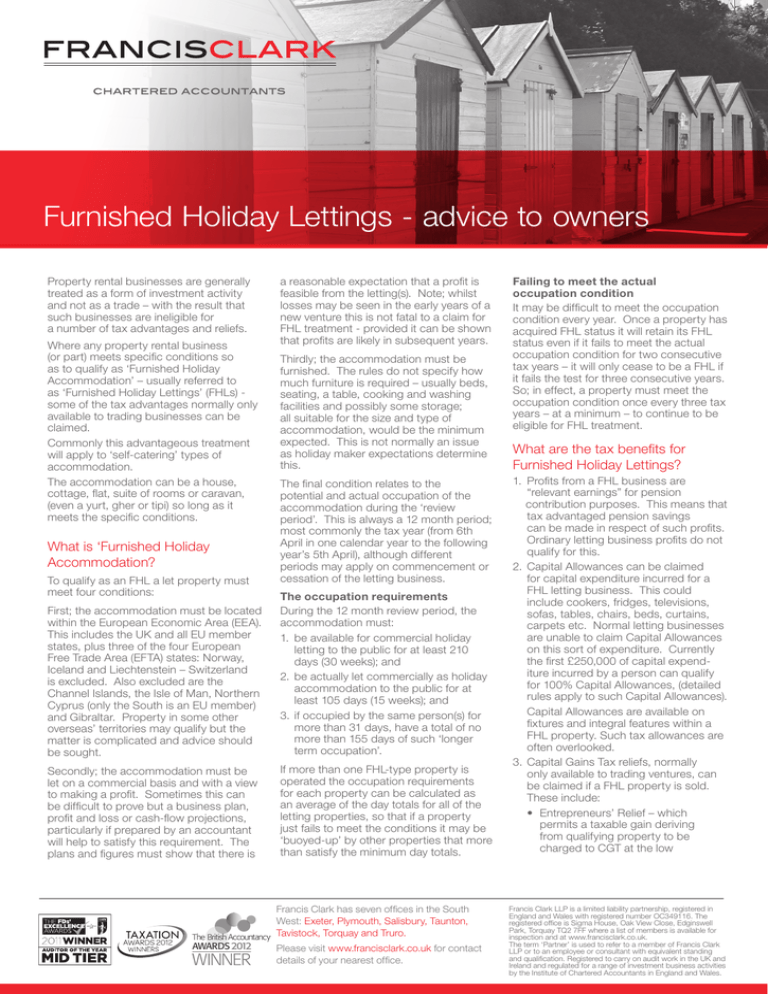
Furnished Holiday Lettings - advice to owners Property rental businesses are generally treated as a form of investment activity and not as a trade – with the result that such businesses are ineligible for a number of tax advantages and reliefs. Where any property rental business (or part) meets specific conditions so as to qualify as ‘Furnished Holiday Accommodation’ – usually referred to as ‘Furnished Holiday Lettings’ (FHLs) some of the tax advantages normally only available to trading businesses can be claimed. Commonly this advantageous treatment will apply to ‘self-catering’ types of accommodation. The accommodation can be a house, cottage, flat, suite of rooms or caravan, (even a yurt, gher or tipi) so long as it meets the specific conditions. What is ‘Furnished Holiday Accommodation? To qualify as an FHL a let property must meet four conditions: a reasonable expectation that a profit is feasible from the letting(s). Note; whilst losses may be seen in the early years of a new venture this is not fatal to a claim for FHL treatment - provided it can be shown that profits are likely in subsequent years. Thirdly; the accommodation must be furnished. The rules do not specify how much furniture is required – usually beds, seating, a table, cooking and washing facilities and possibly some storage; all suitable for the size and type of accommodation, would be the minimum expected. This is not normally an issue as holiday maker expectations determine this. The final condition relates to the potential and actual occupation of the accommodation during the ‘review period’. This is always a 12 month period; most commonly the tax year (from 6th April in one calendar year to the following year’s 5th April), although different periods may apply on commencement or cessation of the letting business. First; the accommodation must be located within the European Economic Area (EEA). This includes the UK and all EU member states, plus three of the four European Free Trade Area (EFTA) states: Norway, Iceland and Liechtenstein – Switzerland is excluded. Also excluded are the Channel Islands, the Isle of Man, Northern Cyprus (only the South is an EU member) and Gibraltar. Property in some other overseas’ territories may qualify but the matter is complicated and advice should be sought. The occupation requirements During the 12 month review period, the accommodation must: 1. be available for commercial holiday letting to the public for at least 210 days (30 weeks); and 2. be actually let commercially as holiday accommodation to the public for at least 105 days (15 weeks); and 3. if occupied by the same person(s) for more than 31 days, have a total of no more than 155 days of such ‘longer term occupation’. Secondly; the accommodation must be let on a commercial basis and with a view to making a profit. Sometimes this can be difficult to prove but a business plan, profit and loss or cash-flow projections, particularly if prepared by an accountant will help to satisfy this requirement. The plans and figures must show that there is If more than one FHL-type property is operated the occupation requirements for each property can be calculated as an average of the day totals for all of the letting properties, so that if a property just fails to meet the conditions it may be ‘buoyed-up’ by other properties that more than satisfy the minimum day totals. Francis Clark has seven offices in the South West: Exeter, Plymouth, Salisbury, Taunton, Tavistock, Torquay and Truro. Please visit www.francisclark.co.uk for contact details of your nearest office. Failing to meet the actual occupation condition It may be difficult to meet the occupation condition every year. Once a property has acquired FHL status it will retain its FHL status even if it fails to meet the actual occupation condition for two consecutive tax years – it will only cease to be a FHL if it fails the test for three consecutive years. So; in effect, a property must meet the occupation condition once every three tax years – at a minimum – to continue to be eligible for FHL treatment. What are the tax benefits for Furnished Holiday Lettings? 1. Profits from a FHL business are “relevant earnings” for pension contribution purposes. This means that tax advantaged pension savings can be made in respect of such profits. Ordinary letting business profits do not qualify for this. 2. Capital Allowances can be claimed for capital expenditure incurred for a FHL letting business. This could include cookers, fridges, televisions, sofas, tables, chairs, beds, curtains, carpets etc. Normal letting businesses are unable to claim Capital Allowances on this sort of expenditure. Currently the first £250,000 of capital expend iture incurred by a person can qualify for 100% Capital Allowances, (detailed rules apply to such Capital Allowances). Capital Allowances are available on fixtures and integral features within a FHL property. Such tax allowances are often overlooked. 3.Capital Gains Tax reliefs, normally only available to trading ventures, can be claimed if a FHL property is sold. These include: • Entrepreneurs’ Relief – which permits a taxable gain deriving from qualifying property to be charged to CGT at the low Francis Clark LLP is a limited liability partnership, registered in England and Wales with registered number OC349116. The registered office is Sigma House, Oak View Close, Edginswell Park, Torquay TQ2 7FF where a list of members is available for inspection and at www.francisclark.co.uk. The term ‘Partner’ is used to refer to a member of Francis Clark LLP or to an employee or consultant with equivalent standing and qualification. Registered to carry on audit work in the UK and Ireland and regulated for a range of investment business activities by the Institute of Chartered Accountants in England and Wales. • • rate of 10%. Gains not eligible to Entrepreneurs’ Relief are subject to a CGT rate of either 18% or 28% depending on the level of an individual’s income and the size of the gain. Only the first £10million of an individual’s relevant lifetime capital gains can qualify for Entrepreneurs’ Relief. Roll-over relief – which allows specific chargeable gains to be deferred if new trading assets are acquired. Gains on the sale of FHLs can be deferred using this relief and the acquisition of a FHL property can count as a new trading asset allowing gains on other assets to be deferred. Hold-over relief – which allows chargeable gains, that would otherwise arise on a gift of the property, to be deferred. 4. If a FHL is operated by a husband and wife partnership the profits can be allocated in any proportion required – irrespective of their actual shares in the ownership of the FHL property. For an ordinary property letting business the profit shares must be divided according to the actual property ownership shares, in the absence of evidence of the ownership shares the profits are divided equally. Other tax issues Losses A loss incurred by a FHL business in any tax year is not available for set-off against any other types of income or gains. The only thing that can be done with such a loss is to carry it forward to the next tax year and set it off against any FHL profit arising in that year. If losses are made over several consecutive years the accumulated losses are carried forward until a FHL-derived profit arises. For this purpose all of a person’s UKbased FHL properties are treated as one business and any EEA-based FHL properties are treated as an entirely separate business. Losses on one cannot be set against the other. Inheritance Tax (IHT) There is no special treatment for FHL property under IHT. So, the market value of any FHL property (net of mortgages) will normally fall within an individual’s estate for IHT purposes and will be subject to IHT in full. In order for an FHL to qualify for Business Property Relief (BPR) it must first be shown that the operation of the FHL amounts to a business. Then it is necessary to show that it is not an investment business. Principally, this requires a high level of services to be demonstrated HM Revenue & Customs (HMRC) are notoriously averse to permitting BPR claims on FHL property. Value Added Tax A FHL letting business is within the scope of VAT. If the total turnover of an individual running a FHL business exceeds the VAT turnover threshold (£79,000 per year from April 2013) it is compulsory to register the business for VAT. Standard rate VAT would then be chargeable on FHL letting income (currently 20%). VAT returns would have to be submitted. The only benefit of VAT registration is that any VAT suffered by the FHL business (input tax) would be recoverable through off-set against the VAT charged on letting income (output tax). The registration limit is not applied on a business by business basis – it relates to all of the business activities undertaken by a particular taxpayer (employments and other investment income do not count). So, if a VAT unregistered individual who has a shop with a turnover of £75,000 acquires a FHL which turns over £5,000 – the turnover threshold has been breached and the individual will have to register, bringing both businesses (shop + FHL) within the scope of VAT. In such a situation compulsory registration might be avoided if one business was run as a partnership (perhaps between husband and wife) and the other as an individual’s activity. Care needs to be taken with such arrangements since HMRC have powers to aggregate businesses together for VAT purposes if they consider that the business arrangements are dictated by a taxavoidance motive. Business rates If self-catering accommodation is available for short-term lettings totalling more than 140 days in a year it will be subject to nondomestic rates (business rates). Thus, all FHL qualifying properties in the UK should be subject to this local property tax, which is based on a property’s estimated annual rental income. Different local authorities apply different reliefs and so reference to each property’s authority will be required. What expenses can be claimed The rules for calculating taxable business profits are applied when working out the profit or loss on a FHL business. The two most important general rules are: 1. To be allowable as a deduction, an expense must be incurred ‘wholly and exclusively’ for the purposes of the FHL business. This means that if the FHL is used for some of the time by the owner or friends and family for a reduced, or no, charge, some of the property expenses will have to be restricted. 2. To be allowable as a deduction an expense must not be ‘capital’ in nature. Capital expenses are usually one-off expenses incurred on the original purchase or construction of a property or on its improvement. Some capital expenditure on plant and other equipment may well qualify for ‘Capital Allowances’ which will give up to a 100% deduction for the capital cost of an item. Capital expenses should be recorded and invoices etc. kept because such costs will usually be allowed against any Chargeable Gains liable to CGT that might arise on the sale of the FHL property. More specifically, allowable expenditure will include: • Management or agency fees for letting • Advertising (including website maintenance) to attract guests • Membership of FHL owners’/other relevant trade associations • Maintenance and cleaning of FHLs • Insurance relating to the FHL business (e.g. buildings, contents, public liability, employee’s) • Accountant’s and other on-going, non-capital professional fees (e.g. debt collecting) • Interest on loans and borrowings to acquire or improve an FHL property – note: the capital repayment element is not allowable as a deduction • Rates, water rates, refuse collection costs and other similar local government charges • Repairs and renewals to either the property or equipment used in the FHL business. This expense heading is often the cause of contention with HMRC over the amount of deductible expenditure. Non-resident owners Where an owner is not resident in the UK then the obligations of the Non-Resident Ladlord Scheme (NRLS) still apply to a FHL just as they do to other property income. It is therefore particularly important that non-resident owners comply with all the requirements of the NRLS as well as considering the tax position in their own country of residence. This publication is produced by Francis Clark LLP for general information only and is not intended to constitute professional advice. Specific professional advice should be obtained before acting on any of the information contained herein. Whilst Francis Clark LLP is confident of the accuracy of the information in this publication (as at the date of publication), no duty of care is assumed to any direct or indirect recipient of this publication and no liability is accepted for any omission or inaccuracy. Francis Clark has seven offices in the South West: Exeter, Plymouth, Salisbury, Taunton, Tavistock, Torquay and Truro. Please visit www.francisclark.co.uk for contact details of your nearest office. Francis Clark LLP is a limited liability partnership, registered in England and Wales with registered number OC349116. The registered office is Sigma House, Oak View Close, Edginswell Park, Torquay TQ2 7FF where a list of members is available for inspection and at www.francisclark.co.uk. The term ‘Partner’ is used to refer to a member of Francis Clark LLP or to an employee or consultant with equivalent standing and qualification. Registered to carry on audit work in the UK and Ireland and regulated for a range of investment business activities by the Institute of Chartered Accountants in England and Wales.
